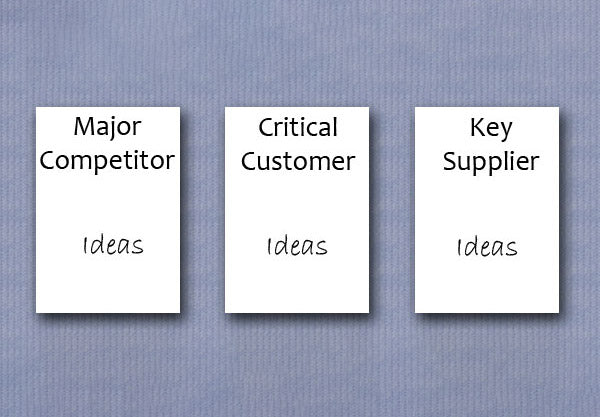Purpose
In this brainstorming exercise participants take different roles to contribute to the problem solving activity. This allows them to contribute without fear of being laughed at or criticised. The roles are defined by a facilitator prior to the brainstorming session to bias it towards a particular direction.
Objective
Adopt several roles when considering a problem and contribute as if looking at the problem from a specific perspective.
What You Need
- Flipcharts. You need one flipchart for each role considered.
- A wall or tables to place the flipcharts on.
Setup
- Ask the groups to consider a problem for the purpose of this brainstorming activity.
- Before starting the exercise, you need a set of roles. You have two options;
- Provide the roles. As the facilitator of the session you can provide a number of roles for this exercise.
- Decide on the roles. Ask the whole group to think of a number of roles to consider for this brainstorming exercise.
- Aim for as many roles as you have delegates so you can run the exercise as efficiently as possible. The roles can be anything, even those that are not directly related to the problem. Examples are:
- A major competitor
- A famous CEO in the industry
- A difficult but important customer
- A critical supplier
- A historic character
- Write one role on each flipchart and place the flipchart on the wall or tables.
- Spread the delegates so each person goes to one of the flipcharts.
- Ask the delegates to consider the role in their assigned flipchart, adopt that particular character and then think of ideas and solutions to the problem only from that perspective. They should record their ideas on the flipchart.
- Allow about 3 minutes for each role and then say “change” so that each person moves on to the next role.
- Continue rotating the roles until everyone has contributed to all roles.
- Ask everyone to go back to the flipchart and study them to see what ideas have been presented.
- Allow for a free discussion on the ideas presented for about 10 minutes.
- Follow with a discussion on the effectiveness of the brainstorming session.
Timing
Explaining the Exercise: 5 minutes
Activity: 10 min deciding roles (optional) + (3 min idea generation * N roles) + 10 min free discussions = 44 minutes for 8 delegates
Group Feedback: 10 minutes
Discussion
What did you think of the quality of the generated ideas? How useful and effective was the Rotating Roles brainstorming technique? Where people able to freely contribute and did it show in the proposed ideas?
Soft Skills Training Materials
Get downloadable training materials
Online Train the Trainer Course:
Core Skills
Learn How to Become the Best Trainer in Your Field
All Tags
Training Resources for You

Course Design Strategy
Available as paperback and ebook

Free Training Resources
Download a free comprehensive training package including training guidelines, soft skills training activities, assessment forms and useful training resources that you can use to enhance your courses.

Our Comprehensive Guide to Body Language

Train the Trainer Resources
Get Insights - Read Guides and Books - Attend Courses
Training Materials
Get downloadable training materials on: Management Training, Personal Development, Interpersonal Development, Human Resources, and Sales & Marketing














Leave a comment
All comments are moderated before being published.
This site is protected by hCaptcha and the hCaptcha Privacy Policy and Terms of Service apply.